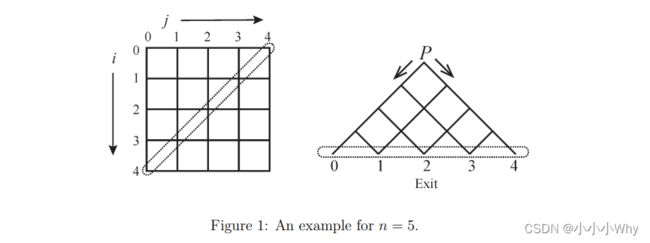The 2020 ICPC Asia Taipei-Hsinchu Site Programming Contest--C.Pyramid
Problem Description
Consider an × grid where nodes are labelled as (, ) for 0 ≤ , < . We rotate it 45 degree in clockwise direction and keep only its top half part. Then you get a pyramid, as shown in Figure 1. All of the nodes laid on the anti-diagonal of the grid have labels ( − 1 − , ) for 0 ≤ < . They are located at the bottom line of the pyramid. For simplicity and clarity, we name node ( − 1 − , ) as exit . Node (0, 0) is called the starting point (labelled as in Figure 1). When you insert a ball from the starting point, this ball will roll down to some of the exits. A ball located at node (, ) can only roll down to either node ( + 1, ) or node (, + 1), and the ball shall never be broken or split. There is a tiny switch equipped on every node other than the exits that controls the move direction of the ball, and this switch always works well. The switch has exactly two states: either or , indicates that the ball can move to node ( + 1, ) or (, + 1), respectively. After the ball leaves this node, the switch changes immediately to the other state. The default setting for a switch is at .
When you insert the first ball into , this ball will reach exit 0, and the states of nodes (, 0) for 0 ≤ < − 1 are now all ’s. Then you insert the second, third, and so on so forth, one by one, until the ℎ ball finishes. The status of every switch accumulates with these balls. Please write a program to determine the number of the exit point for the ℎ ball.
Input Format
The first line of the input is a number that specifies the number of test cases. Each test case has only one line that gives you two space-delimited numbers and .
Output Format
Please output the exit number of the ℎ ball in one line.
Technical Specification
• There are at most 20 test cases.
• 1 ≤ ≤ 10^4 . • 1 ≤ ≤ 10^8
Input
3
5 3
5 4
5 5
Output
2
3
2题意:刚开始每个节点都是关闭的,放球,如果该节点是关闭的,那么会向左下走,否则右下走,然后改变节点的状态(开关),问你第k个球最后落在哪个下标(从0开始)。
解析:我们可以求出前k-1的球落完之后的状态,那么模拟最后一个球就很容易了,需要知道对于一个节点,如果有m个球经过,那么有![]() 去往左边,有
去往左边,有![]() 去往右边,那么我们最开始让k-1个球从起点落下跑一边就可以得到k-1的球导致的状态。
去往右边,那么我们最开始让k-1个球从起点落下跑一边就可以得到k-1的球导致的状态。
虽然可以进行优化,但是这种方法好理解
#include
const int N=10005;
int a[N][N];
void solve()
{
int n,k;
scanf("%d%d",&n,&k);
a[0][0]=--k;//前k-1个球
for(int i=0;i 